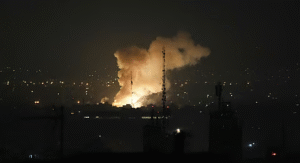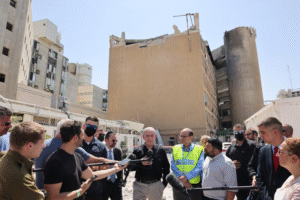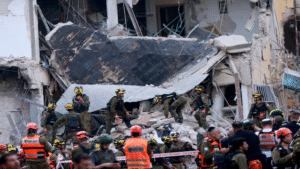The Ground Trembles: US-Israeli Strikes on Iran’s Nuclear Sites and the Specter of Escalation
The dawn of June 22, 2025, etched itself into the annals of geopolitical tension with chilling clarity. The announcement that the United States, in direct coordination with Israel, had launched precision strikes on three critical Iranian nuclear facilities – Fordow, Natanz, and Isfahan – sent shockwaves across the globe. This unprecedented direct involvement of the US military in the ongoing conflict between Israel and Iran marks a significant and perilous escalation, pushing an already volatile Middle East to the precipice of a wider, potentially catastrophic, regional conflagration.

Targeting the Core: Iran’s Nuclear Infrastructure Under Attack
The choice of targets – Fordow, Natanz, and Isfahan – underscores the gravity of the operation. These are not arbitrary locations but the very heart of Iran’s disputed nuclear program. Fordow, deeply buried within a mountain, is notorious for its hardened defenses, making it a particularly challenging target. Natanz is Iran’s primary uranium enrichment facility, while Isfahan houses a nuclear technology center and research reactors. The reported use of specialized “bunker buster” bombs and Tomahawk cruise missiles by the US suggests a deliberate and determined effort to inflict maximum damage on these critical components, aiming to severely set back Iran’s nuclear capabilities. The explicit goal, as stated by US and Israeli officials, is to prevent Iran from acquiring a nuclear weapon, which they assert Tehran is actively pursuing or could quickly assemble.
Immediate Repercussions and Global Alarm
However, the immediate aftermath of these strikes has plunged the region into a state of heightened anxiety. Iran’s swift and defiant response, vowing “severe consequences” and reportedly launching missiles at Israeli cities, demonstrates its resolve and the immediate danger of a tit-for-tat escalation. The closure of Israeli airspace and heightened security alerts in major US cities serve as tangible indicators of the palpable fear of retaliation. The International Atomic Energy Agency (IAEA) and Iran’s National Nuclear Safety System Centre have stated there is no increase in radiation levels around the targeted facilities, but this has done little to quell broader concerns. The international community, led by the UN Secretary-General, has voiced “grave alarm,” desperately appealing for restraint and diplomacy. These pleas highlight the shared understanding that a full-blown regional conflict would have devastating humanitarian, economic, and geopolitical repercussions far beyond the Middle East.
The Long Road Ahead: Strategic Fallout and Uncertainties
The long-term implications of these strikes are complex and uncertain. While the immediate aim might be to degrade Iran’s nuclear infrastructure, the strategic fallout could be multi-layered. Will Iran be deterred, or will these attacks embolden it to accelerate its nuclear ambitions, perhaps even withdrawing from international safeguards and pursuing a weapons program more openly? Furthermore, the direct US involvement raises questions about the future of its engagement in the Middle East and its relationship with allies and adversaries alike. The reactions from various nations, ranging from Israeli commendation to condemnation from countries like Pakistan, underscore the deep divisions and potential for a realignment of alliances. The impact on global oil markets, already volatile, is also a significant concern, with prices expected to climb further, potentially straining a fragile global economy.
Conclusion: A Perilous Gamble
In conclusion, the US-Israeli strikes on Iran’s nuclear sites represent a dangerous gamble. While the stated objective is to prevent nuclear proliferation, the path chosen carries immense risks of further destabilization and a wider war. The world watches with bated breath as the consequences of this significant escalation unfold, hoping that diplomacy, however difficult, can still prevail over the escalating cycle of violence and lead to a more stable and peaceful resolution.




















